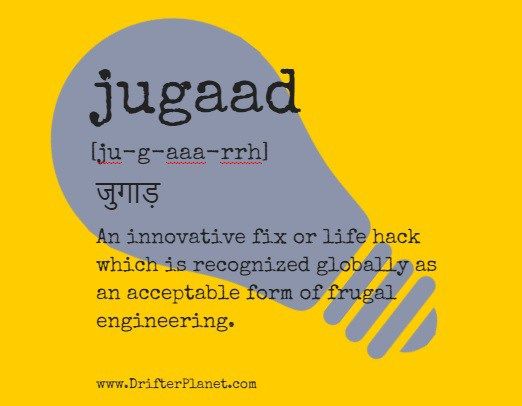Our Love Affair with Jugaad: It Just Works!
When Innovation Meets Imagination (and a Little Bit of Tape)
“Jugaad: The Desi way of solving problems!”
You cannot have idli without chutney and sambar without dosa, biryani without raita, or monsoon without sizzling bhajis! In the same way, you absolutely cannot separate Indians and Jugaad. In India, you cannot survive without Jugaad.
Jugaad is an essential part of Indians. You do Jugaad in your day-to-day life. I mean, come on! We live for Jugaad! The last time I did Jugaad was 3 days back. We had no electricity, and we had to eat. So, I simply took my small torch and tucked it in the start of my braid to keep it upright. The room was lit, and I could use both of my hands!
Now, you hear this word every day. But what is Jugaad?

Jugaad is that pinch of innovation that feels stupid but works efficiently; it’s an unconventional innovation. I would describe it as that fan theory that does not feel real but makes complete sense! ( kinda like, The Moon Landing, don’t sue me.)
It can be said that creation feels silly but just makes sense! I mean, if the shoe fits, it fits, right? It is a long definition for such a simple thing! In Hindi, Urdu, and Punjabi, people just use one word: Jugaad. This term is now used all over the country.
Jugaad has been instilled in Indian people for far too long. Some say it’s a mindset. A mindset that will help you do anything that you want with simple, out-of-the-box thinking. You can consider it as whatever you want: a virtue or a mindset. The point is: it is an Indian thing to do!
One of the best examples of Jugaad I can think of is the Mangalyaan. Using a rocket that can only transport your satellite as far as Earth’s high elliptical orbit to break gravity and assist in reaching another planet!
ISRO had made and launched a satellite in just a budget of ₹450 crore ($74 million) by focusing on efficient engineering, cost-effective design, and reusing existing technology. The mission’s budget cost less than the Hollywood film “Gravity,” which cost around $100 million! It is one of the cheapest and most efficient Mars missions to date! So, what do you know! Jugaad is cost-effective as well!
Another common Jugaad that is used in every Indian household is the “no-oven recipe.” We use pressure cookers to bake cakes and other baked goods. These recipes are not only easy but also convenient to make in a household when we do not have ovens. The Indian tradition of saving plastic bags in your house? Yeah, that’s a jugaad!
Personal experiences state that Jugaad helps you adapt to newer surroundings as well! One of my friends who lives in a hostel used a kettle to cook rice. It sounds weird, but it tasted all right! My uncle recalled how he had used a broken badminton racket to hang a bird feeder outside his window.
One thing that I love about Jugaad is the fact that whenever you try to explain it, it sounds so funny! Like, what do you mean you wore a stapled shirt for the whole day just because you can’t stitch?
You see, all of us are so accustomed to Jugaads that we don’t even realize that we just did one! It is only when someone points it out to you that you realize that you just used a rather unconventional method to solve your problem.
But why is Jugaad considered to be so significant?
The answer is simple. Jugaad is popular for its ability to give us an improvised but effective solution to a problem. It’s resourceful, adaptive, resilient, and inclusive. One of the best reasons that we can find behind Jugaad gaining its popularity in India is history.
India has a huge history of invasions and droughts. These adverse conditions forced our people to find shortcuts in their day-to-day lives. The ancestors had to make sure they were being resourceful due to limited supplies. This skill of being able to make do with limited supplies soon became an important part of us, helping us become who we are today.
Jugaad has impacted our lives in more than one way. It has taught us to be resourceful. We became more sustainable, more creative, and most importantly, we learned to live with what we had. In today’s world, that quality is especially important.
Jugaad has proved to be helpful in many fields of life, science, technology, business, and many more. It is particularly popular in rural India.
In the rural parts of our country, there is a limited amount of resources available. The people living there have to use their resources carefully. Jugaad is the most effective way to do that. That’s why we see people doing more jugaad in the rural areas than the urban ones, as the urban areas have enough sources for themselves.
But even this Indian way of effectiveness and resourcefulness has faced backlash internationally!
Earlier, many foreigners had expressed their disbelief in the “practice” of jugaad. They viewed this method as a way of creating chaos and disorder in society due to these unconventional methods. Since Jugaad does not follow the traditional “western method of solving problems,” many foreigners have disregarded it, misunderstanding its intended purpose.
But slowly, as time evolved, people started to embrace the uniqueness of this. Resourcefulness and adaptability played a major role in this global popularity. Jugaad has been and is a source of inspiration for people abroad.
Nowadays, more and more companies are accommodating this style. The main goal is making their products affordable while using fewer resources. It has also enabled them to reduce production costs, allowing them to make profits.
Fun fact: We can find a lot of articles written about jugaad online, many of them from international universities! This shows how much the concept of jugaad has evolved over time and how people have started viewing it differently.
We also have a book called “Jugaad Yatra: Exploring the Indian Art of Problem Solving” by Dean Nelson.
In the book, he states, “When you couple this resourcefulness borne from hardship with India’s competitive culture, you’re going to get different solutions than you would elsewhere.”
This shows the amount of influence this Indian mindset has on international countries.
Jugaad is highly recognized as one of our qualities, if you can say that. But some people criticize this very quality of our country. Many say that Jugaad has been helpful yet harmful for us. While these ‘hacks’ hold potential, they seem to be holding the country back.
We have started to look for the “easy way out.” This is hampering the innovativeness of the young generation. Often, when people look for a “jugaad” in important tasks, it ends up in a disaster. People have to understand when they have to work hard and when they can survive with a jugaad.
One important distinction is that Jugaad is not about getting the easy way out. It is about being resourceful and making the best out of your situation, kind of like “finding the silver lining.”
Jugaad is an important aspect of our lives. Over time, it has evolved into a prominent part of our lives. We cannot, in any way, imagine our lives without jugaad. We have earned the title of being jugaadi throughout the years. We wear the #jugaadination tag with pride.
There’s no wrong in “jugaad-ing” your way through life. What’s important is whether you are being resourceful or not. Now, ending this serious speech on a serious note. We know now that Indians are the most jugaadi people in this whole world. So remember that poor plastic bottle? The one that you punctured holes into? To water the plants? Sounds like you are a professional jugaadi! Keep it up with resourcefulness and innovativeness, my friend!
Thanks for reading, fr! Share if you like it enough. Follow us on Instagram & LinkedIn for more.


